
The forecasting about Russia’s misinformation campaign aimed at diverting attention to another ‘unsuitable’ target in matters of supplying weapons to Hamas militants for attacking Israel was confirmed.
On October 7, RLI warned that by using its warm relations with Hezbollah, Russia would send to the Gaza Strip a few units of weaponry captured on Ukraine’s battlefields – as evidence to back their claims.
The next day, October 8, Russian affiliated military intelligence-Telegram channels were actively spreading a fake story claiming that Israeli soldiers near Ashkelon had found a pickup truck with a Soviet-made RPG-7 anti-tank grenade. The weapon allegedly had markings of a ‘Ukrainian unit from Mukachevo, Zakarpattia region’.
As we know, this weapon belongs to the 128th mountain infantry brigade of the Armed Forces of Ukraine. While studying the materials, we came to the conclusion that this is the part of the weapons (including Soviet RPG-7 and AGS-17 automatic grenade launchers) the mentioned unit lost in December 2022 near the village of Pidgorodne, one mile in the north- east of Bakhmut town. They left the weapon while withdrawing from its positions, which came under the control of the Wagner PMC militants.

In this way Ukrainian Soviet-type weapons were transported by the Wagner Group to Russian territory, then the ammunition was sent by Russian Aerospace Forces to the Khmeimim airbase, Syria, and further to the training bases of Hezbollah and Hamas fighters in the vicinity of Damascus. However, we found evidence of Hamas militants being armed with Russian export AK-103-2 assault rifles.
 Islamic Jihad fighter with AO-103-2 assault rifle.
Islamic Jihad fighter with AO-103-2 assault rifle.In 2019, we tracked illegal AK-103 rifles sales on the Iraqi market after the Assad regime government supplying the guns.
The AK-103 entered service in Russia in 1993, precluding its placement in Soviet-era warehouses. Thus, these facts confirm the Kremlin’s involvement in the preparation and organization of the Hamas operation against Israel. As far as we know the Wagner and Redut mercenaries trained Palestinians at the training bases in Syria. Since both Russian units are under the operational control of the Main Directorate of the General Staff (formerly the GRU), the transfer of captured weapons to the Middle East is part of Russians’ preparations of the special operations in the region and may indicate that the attack on Israel could have been planned in the spring-summer of 2023.
Moreover, we think that there is a high possibility that Russian PMCs could enter the arms market by supplying both captured and Russian Soviet-style weapons to paramilitary and terrorist groups in the Middle East and Africa.
Prior, we published a report on ties and supplies of Russian weapons to terrorist organizations in the Middle East; in particular, the weapons were used during attack an Israeli school bus.

More on this story: Russia is staking on the Hezbollah
It is unlikely that the Israeli Merkava battle tanks were destroyed by Palestinian operators launching civilian drones equipped with a combat element drop system. Such an accuracy proves a high-skilled training and practice of the drone operators.According to our estimates, the UAV operators were trained by Iranian or Russian specialists who have got their skills during the war against Ukraine.

Last March, a Palestinian delegation arrived in Moscow for talks with Russian officials. The delegation was from Hamas, the militant Palestinian group that's been labeled a terrorist organization by the United States and the European Union. The meeting, according to the Russian Foreign Ministry, touched on Russia's "unchanged position in support of a just solution to the Palestinian problem."
"When considering the issue of restoring Palestinian national unity, the Russian side expressed its readiness to continue to assist in overcoming differences and bringing together the positions of leading Palestinian political forces and movements on the platform of the Palestine Liberation Organization," the ministry's readout said.
Russia's ties to Hamas are well-documented, as are its ties to Hamas's main backer, Iran. For some observers and commentators of the ongoing bloodshed in Israel, that in itself is cause for blaming Moscow, accusing it of having a direct hand in the spiraling violence.
That's not correct, said Hanna Notte, a Berlin-based analyst with the James Martin Center for Nonproliferation Studies and an expert on Russian policy in the Middle East.
Russia's embrace of Iran has benefited Moscow in its war on Ukraine, with Tehran supplying kamikaze drones and other equipment to help Russian forces seeking to hold back a slow-moving Ukrainian counteroffensive. But it's a big stretch to extrapolate from there and say Russia would endorse Hamas's bloody assault and risk outright disruption in relations with Israel, whose ties to Moscow are lukewarm but certainly not hostile, she said.
In an October 9 phone interview with RFE/RL, Notte explained more of the nuances involving Russia's role in the Middle East. The interview has been slightly edited for clarity and grammar.
RFE/RL: You are skeptical of speculation that there could somehow be a Russian role in this attack? Is there any indication that they might have some sort of direct, or indirect connection to this?
Hanna Notte: So looking at this, there've been selective reports over the last years, and this predates the war in Ukraine, that Russian-made systems have shown up in Hamas's hands. Anti-tank missiles, shoulder-launched, anti-aircraft missiles; this goes back years and Israel, at the time, assumed that these weapons fell into Hamas hands via Iran. So I've never seen an indication of direct, large weapons shipments from Russia to Hamas, let alone Hamas being trained by Russian military. And again, in the context of this latest attack, I have yet to see the evidence that this is Russian weapons or that the Russians have trained Hamas. So I don't see a direct role here.
I don't think that Russia wants to go all-in with Iran, that it wants to disrupt its relations with Israel and with Gulf states.
Of course, Russia-Hamas relations go way back. I mean, they were invited to Moscow, I guess, in 2006, after they won the election in the Palestinian territories, and there've been Hamas delegations that have been going ever since. You know, the Russians have been quite active in recent years, trying to mediate between different Palestinian factions. And of course, they've never recognized Hamas as a terrorist organization. They've always argued that, you know, the different factions need to forge unity.
And it's sort of a niche that the Russians have carved out for themselves on the peace process, because they've lamented quite frequently in the last few years that the Americans monopolize the peace process, especially during the Trump administration and the ‘Deal of the Century' [a controversial Trump-era peace proposal]. So they tried to carve out this niche, priding themselves on talking to all the Palestinian factions. Factions came to Moscow frequently.…
So Russians have been active on the Palestinian side, and that goes back historically. The Soviet Union took quite a pro-Palestinian stance. The Russian [Foreign Ministry] has historically taken quite a pro-Palestinian stance or a very, as it says, a very even-handed approach on the conflict. So these relations go way back. That is true. But I don't think that we can infer from that, that there is sort of direct military support.

There's another question about whether Russia's role matters indirectly here. I would argue that because of the war in Ukraine, because of the severe deterioration in Russia-West relations, and therefore, the changing geopolitics of the Russia-Iran relationship, Russia is, broadly speaking, enabling Iran more in the region. So Iran feels more emboldened. Iran gives drones and other support to Russia. It is probably getting some sort of support from Russia in return.
The Russians have become less enthusiastic about seeing the JCPOA [the 2015 Iran nuclear deal] being restored. They've become more forgiving of Iran. And so this general sense of ‘emboldenment' might be playing into what we're seeing right now. So there is a Russia, there is a Ukraine war connection here, but I see it as being more indirect as opposed to direct.
RFE/RL: Okay, well, you've jumped into three questions that I planned to ask there, so that's great. So what is the benefit that Russia might somehow gain from all this?
Notte: I'm a bit of two minds here as well. I think on the one hand, it is certainly true that fostering instability, tensions, violence in the Middle East is broadly speaking beneficial to Russia right now. If they can foster crises and instability elsewhere, and deflect attention from Western states, from the United States primarily, away from Ukraine and from NATO's eastern flank, that is beneficial in the broader geopolitical game right now. If a byproduct of what we're seeing right now is to throw a wrench into Israeli-Saudi normalization talks, I think that's also welcome to Moscow because Israeli-Saudi relations, that's an American game. So that's sort of on the benefit side for Russia.

On the potential negative side for them, I look at Russian foreign policy in the Middle East as a policy that is about fostering carefully calibrated instability, low-level instability. I don't see how if this escalates into a bigger war, an Israel-Iran confrontation that might then well engulf Lebanon and Syria, how this would necessarily be beneficial for Russia. Because the Russians have naval and air bases in Syria, which are very important to them; they project power into the eastern Mediterranean from those bases. Those bases are important as logistics hub for the Russians to continue their operations in Africa and the Sahel and … Wagner [the Russian mercenary group founded by the late Yevgeny Prigozhin] is staying in the game in Africa.
So Syria is important. Now, if Syria gets destabilized by a broader war, the Russians don't necessarily have the military bandwidth right now to deal with such a situation. So I'm not sure that the bigger war is necessarily in their interest. And it's not something that they need, I think -- sort of more calibrated escalation is more beneficial to them."
RFE/RL: That's my next question: Whether Russia has the bandwidth, as it were, to deal with a broader regional war when they have a major investment of military capabilities now tied up in Ukraine: Can they juggle two balls at the same time?
Notte: It's a good question. It would depend on what kind of Russian involvement would be required. They have kept their bases in Syria. They have kept much of the military hardware in Syria. But that's been sufficient for keeping the situation under control in Syria, as is, and major combat operations have largely ceased in the country over the last years. The only thing is that you still have what 800-900 American troops in northeast Syria and the Russians have been harassing them more intensively over the last six months, because I think there is, over the medium term, a Russian game to try to push the Americans out of Syria. But a bigger war? That's a different ballgame.
My own view is that there's no doubt that Russian-Iranian relations have qualitatively changed. But still, I don't think that Russia wants to go all-in with Iran, that it wants to disrupt its relations with Israel and with Gulf states. Now, if there's a larger war, and the Americans come down hard on the side of Israel, as would be very much expected. I think, you know, I mean, they've already sent the aircraft carrier to the eastern Mediterranean, there's no doubt where the Americans would come down in this larger war.
The question then that I have is: Will Russia have to pick sides? Will Russia see no choice but to further drift into the Iranian orbit, if there's a larger war? They might have to. I'm not sure that they want to. And so that is also why I don't think the Russians want the situation to go to such a larger war.
RFE/RL: Talk about Moscow's relationship with Israel these days. It it hot? Is it cold? Ukrainian President Volodymyr Zelenskiy voiced solidarity with Israel. How would you how would you characterize that relationship these days?
Notte: Maybe lukewarm, but better since [Prime Minister Benyamin] Netanyahu came to power in December. It was more frosty [previously] given the Israeli reaction after the Bucha attack; they criticized Russia quite harshly. But, Israel has [as of] today not delivered lethal weapons to Ukraine. And I think that is appreciated in Moscow, and they want to keep it that way.
So there have been tensions, but there is still a fairly significant trade relationship. There is the big Russian diaspora in Israel, which predates the Ukraine war, but it's become even bigger since the Ukraine war started.
And there is from the Israeli viewpoint, most importantly, deconfliction over the skies in Syria. That is the primary reason why the Israelis have been so cautious vis-a-vis Russia, and not joined sanctions and not provided lethal support to Ukraine.
And so, yes, it's been it's been more rocky than usual, but the personal relationship between Bibi [Netanyahu] and Putin somewhat helps. They get along.
Since Netanyahu came to form the government, it's been slightly less acrimonious. But I think from Russia's point of view, keeping the Israelis from going firmly over to Kyiv's side is important, which is another reason why I sort of personally fail to be convinced that the Russians directly supported Hamas here, because if they did, I would assume that the Israelis will find out sooner rather than later. And then you have lost the Israelis completely if you're Russia, potentially, and I'm not so sure that you would want to risk that because to keep them from supporting Ukraine has been fairly important to Russia.
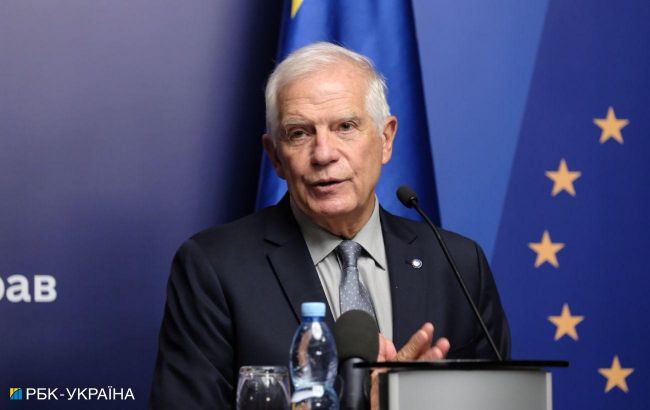
"I am convening tomorrow an emergency meeting of EU Foreign Ministers to address the situation in Israel and in the region.," he wrote.
Hamas attack on Israel
On October 7, Hamas terrorists infiltrated Israeli territory from the Gaza Strip. They managed to capture several settlements, but by evening, Israeli forces regained most of the territory. They also struck military targets and the Hamas headquarters in response.
Israel declared a "state of war" and the beginning of the counter-terrorism Operation Iron Swords.
Today, the IDF announced that Israel has regained control of all areas, but Hamas militants may still be on the territory.
Additionally, European countries have strengthened the protection of Jewish communities after the Hamas attack on Israel.

Some of the Wagner PMC fighters who left Belarus for Africa were involved in training and transferring combat experience to Hamas militants.
This was reported by the National Resistance Centre, Censor.NET reports.
"The key areas of training for Hamas militants have been assault training and the use of small unmanned aerial vehicles to drop explosive material. Only the Russians, among Hamas's allies, have experience in using drones with mechanisms for dropping explosives on enemy equipment. It was the Wagner drones that were handed over to Hamas militants during exercises in Africa," the report said.
Sergej Sumlenny, the Russian-born managing director of the European Resilience Initiative Center in Berlin, says this morning’s bomb-dropping drone video in Israel has Russian fingerprints.
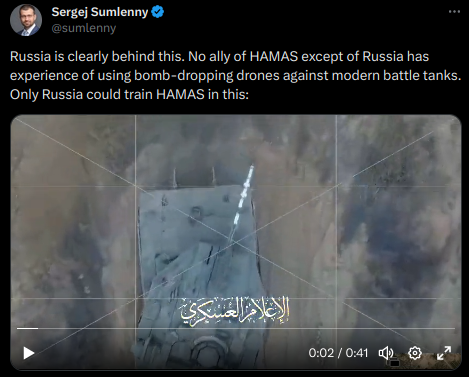
The reported widespread electronics jamming, effectively disabling countermeasures, coupled with such a single precision anti-armor bomb does seem a bit contrived to be just Hamas.
Marko Mihkelson, Chairman of Estonia’s Foreign Affairs Committee, has also pointed out the relevance of Russian attempts at destabilizing regional security.
The timing and reasons for the Hamas attack are linked to Russian and Iranian interests. Hamas is known to be strongly supported by both countries. Hamas leaders have twice held consultations in Moscow in the last 12 months and it is quite obvious that Russia has a wider interest in both distracting attention from Ukraine and, on the other hand, complicating Israel’s rapprochement with Saudi Arabia by creating tension in the region.
It’s worth noting that while the majority of the world is quick to condemn Hamas for initiating terrorist attacks on Israel, Russia is officially adopting a “both sides” narrative.
We call on the Palestinian and Israeli sides to implement an immediate ceasefire…
Already in three ways you should be able to see the problem.
We have tactical evidence showing the sophistication of an invisible bomb-dropping drone, political evidence indicating recent consultations between Hamas and Moscow, and then we see Russia taking a weak-kneed stance on terrorist attacks.
Moreover, as if three ways weren’t enough, there is additional evidence of Russia’s hand in the form of unusually sophisticated attacks targeting civilians.
…planned, coordinated and large-scale attack by militants, which resulted in dozens of victims in the first hours of the attack. At the same time, the victims were civilians who were shot by Hamas militants in towns near the Gaza Strip.
Hamas suddenly demonstrated unusually coordinated (loud) multi-front incursions and immediately started shooting to kill any civilians they encountered anywhere. One reporter described nine Israelis simply waiting at a bus shelter being gunned down in cold blood. A music festival for peace was ambushed, with at least 240 people murdered in a “killing field“. Another report described Hamas targeting and killing a civilian paramedic in a marked ambulance while he was engaged in medical duties.
The unfortunate twist to these escalating terror attacks, before we delve too deeply into Russia pushing such horrible events, is that Hamas also may have been pulled into Israel’s far-right extremist strategy of provocation and wait.
Russian President Vladimir Putin has welcomed the return of Benjamin Netanyahu as head of the most far-right Israeli government the country has known and signaled an intention to strengthen cooperation, the Kremlin said.
Israel’s newly elected PM had “chosen Putin over Biden” and refused to arm Ukraine against Russia. Meanwhile he instructed his government to “pursue” full annexation of the West Bank and put a “professional extremist troll” in charge of police. A former chief of staff for the Israeli leader revealed in April 2023 that Netanyahu was aligning himself with Russia’s “win at all costs” mentality, seeking unilateral undemocratic control much like Putin.
He wants to be like Putin, is seeking unlimited power.
And so earlier today we heard of Hamas throwing themselves abruptly into a brazen attack, and then the phrase…
Israeli Prime Minister, Benjamin Netanyahu, declared earlier: “We are at war and we will win”
Netanyahu was facing heavy and growing domestic political resistance before this massive terror campaign erupted. What does Russia have to lose by throwing Israel’s leader a sad excuse to end democracy, attack Hamas and invade Gaza (let alone annex the West Bank)? Russia is desperate for allies, and Israel’s increasingly far-right extremist political government seems willing to oblige for a small favor — starting a war.
The most straightforward argument against any notion that Putin and Netanyahu have conspired to manipulate this situation, with the aim of cornering Hamas militants in an untenable position of killing hundreds of civilians, is that this war is being reported as a significant intelligence failure on Israel’s part.
How is it possible that, on the most heavily surveilled border in the world, equipped with cutting-edge defensive technology and an extensive intelligence network, Israel was caught off guard by a group of gun-waving irregulars on tractors, motorboats, motorcycles, and paragliders?
Yes, I said paragliders, for those who remember the 2014 Malaysian-trained Hamas arrests followed by a very strange July 2023 German diplomatic gaffe.
Israel has condemned the EU’s outgoing envoy to the Palestinians after he paraglided over Gaza’s coast to draw attention to the blockade of the strip. A video showed Sven Kühn von Burgsdorff declaring he had carried out “the first Gaza paragliding flight in history”. “Once you have a free Palestine, a free Gaza, you can do exactly the same thing,” the German diplomat adds. Israel’s foreign ministry said it was a “provocative action” that served as propaganda for militant groups in Gaza.
And now, surprise!
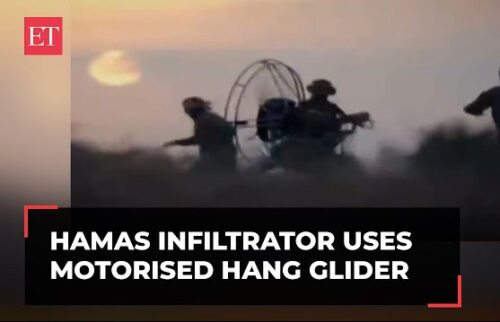 October 7, 2023. Source: ET
October 7, 2023. Source: ETHistorians also will undoubtedly highlight and contrast today with Prime Minister Meir’s situation on October 6, 1973. She had intelligence suggesting an impending attack on Israel but, based on her military advisors’ counsel, chose not to launch a preemptive strike. This controversial decision led to an establishment of the Agranat Commission of Inquiry to investigate “military failings” and ultimately resulted in her decision to resign.
She is shown taking the fall for the egregious errors of her military leaders — in particular Chief of Military Intelligence Eli Zeira and Defense Minister Moshe Dayan — to protect the public’s faith in its army. Documents declassified in 2020 showed that Zeira ignored intelligence warnings that Cairo and Damascus were poised to attack, withholding the communications from the government in his belief that the chance of imminent war was “lower than low.” Meanwhile, Dayan objected to fully mobilizing troops in the hours before the war, according to his testimony to the Agranat Commission, which was declassified in 2008.
That article about the war of October 1973 was published only a couple months ago in August. It concludes with an interesting prediction.
…leadership blinded by hubris and power can poison a society. He referenced the current political crisis in Israel, in which Prime Benjamin Netanyahu’s efforts to weaken the Israeli Supreme Court have triggered mass protests that have been ongoing since January. “It’s kind of crazy that today we see the Yom Kippur of democracy in Israel,” said Nattiv. “The blindness again, the same debacle that happened in 1973 is returning now.”
Here we are, witnessing a situation that mirrors the events of 1973. Some people speculate now whether Netanyahu will face consequences for either knowingly or unknowingly allowing a Yom Kippur War II, but historically his reputation has been marked by a lack of accountability.
One has to wonder whether Netanyahu (in consultation with Putin) has planned this whole thing, including of course how to avoid a fate similar to Meir’s through various means.
Firstly, Netanyahu has shown no intention of stepping down for any reason. Furthermore, the element of surprise could enable Netanyahu to gain control over the military and enforce military service through declarations of war. This is especially important given recent protests against his leadership and refusals to serve in the military. Additionally, it might contribute to the growing normalization of relations between Saudi Arabia and Israel by forcing them to choose sides in a conflict. Lastly, it fosters radicalization among Israelis, pushing them into an “us versus them” mindset that undermines compromise and moderation, which aligns with the goals of Netanyahu (and Putin).
Hamas is Iran so that’s the obvious part for me, but too few are talking about the gift from Russia. Iran gives basic munitions stock to Russia for their invasion of Ukraine, Russia then gives training and ops tech to Iran for their invasion of Israel.
Electronics jamming and high precision anti-armor attack drone… that’s Russia practically begging to be recognized. The only thing more Russian is trolling the world with an official statement for “both sides” to ceasefire in a terrorist attack.
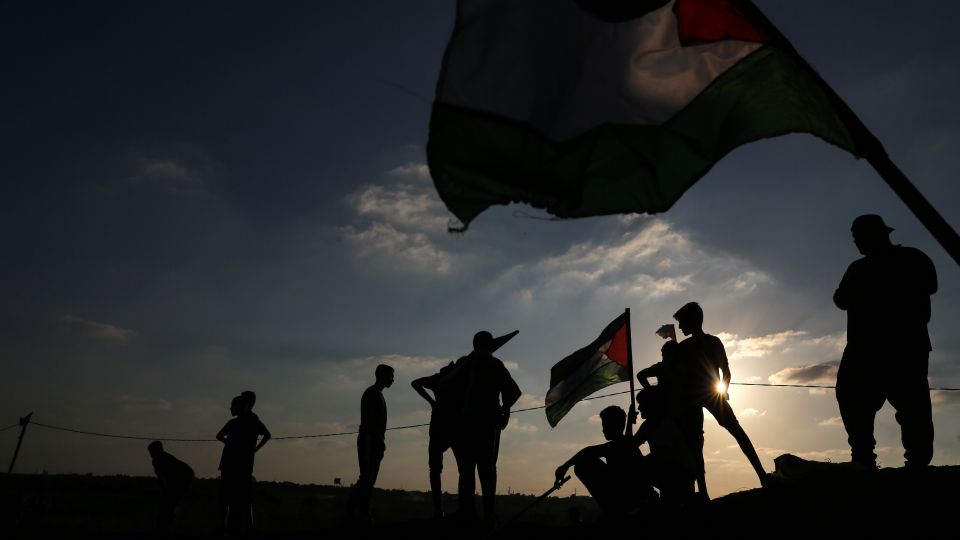
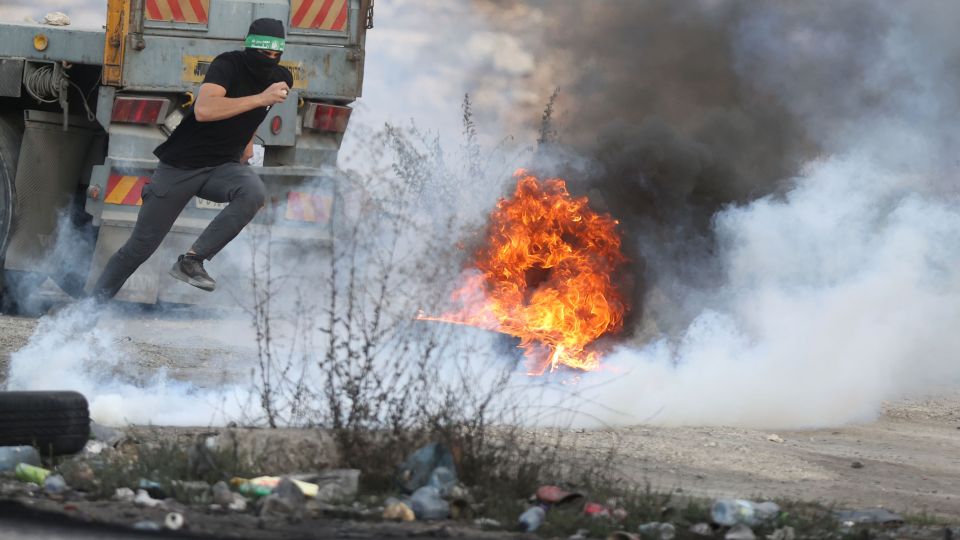
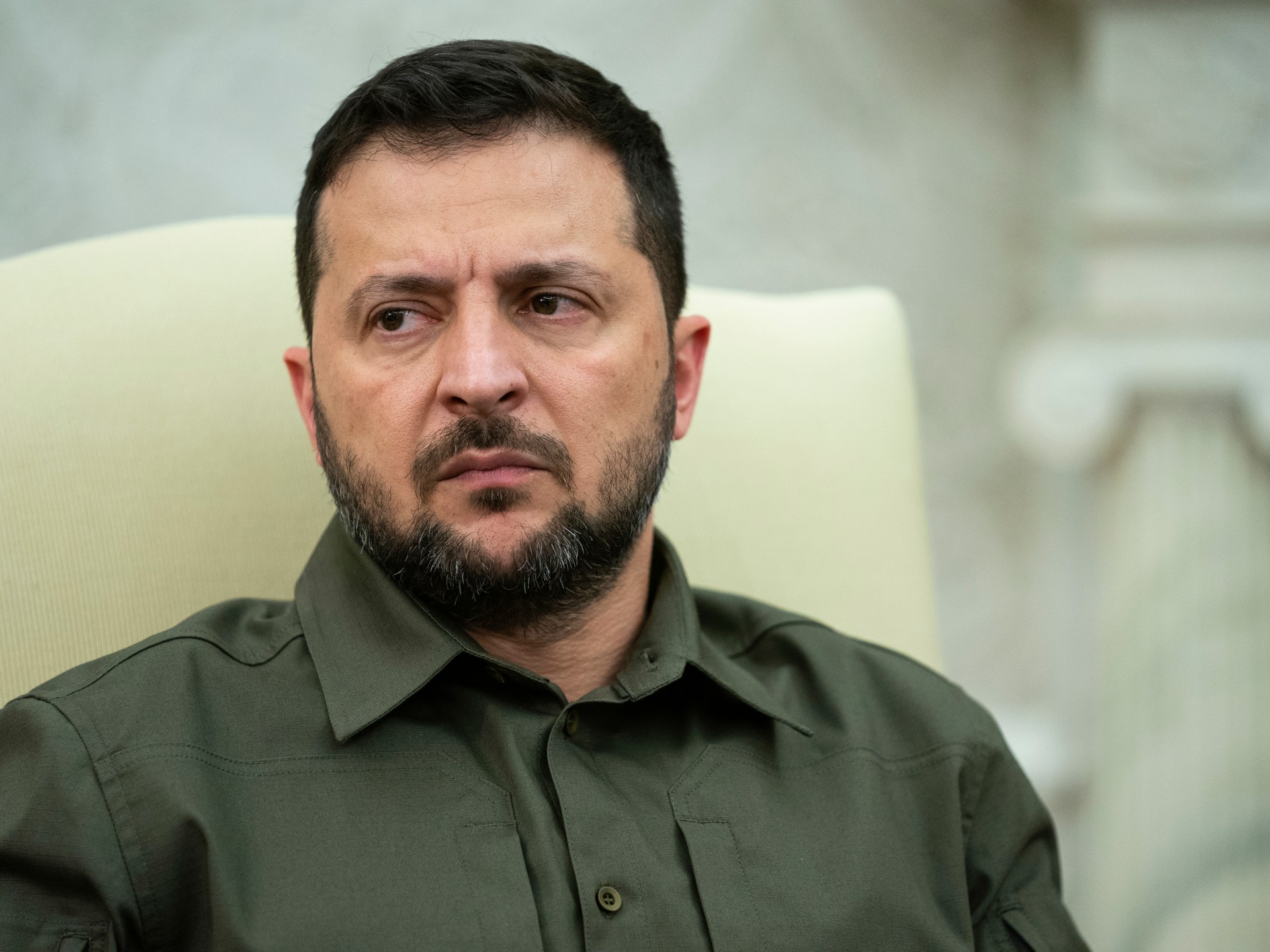
Published On 9 Oct 20239 Oct 2023
Ukraine’s President Volodymyr Zelenskyy has linked the recent assault by Hamas on Israel with Russia’s invasion of Ukraine and criticised Iran over both conflicts.
On Monday, he likened the Palestinian armed group to Russia, saying it was a “terrorist organisation” while Russia can be considered a “terrorist state”.
list of 4 itemslist 1 of 4list 2 of 4list 3 of 4list 4 of 4end of listZelenskyy told NATO’s Parliamentary Assembly in Copenhagen via video link: “The only difference is that there is a terrorist organisation that attacked Israel and here is a terrorist state that attacked Ukraine. The intentions declared are different, but the essence is the same.”
Ukraine said about 1,000 Iranian-designed Shahed drones were used by Russia over the past six months.
“Iran can’t say it has nothing to do with what is going on in Ukraine if it sells Shaheds to Russia. Iran can’t say it has nothing to do with what is going on in Israel if its officials claim the support of what is going on in Israel,” Zelenskyy said.
Israel-Hamas war
Israel was caught off guard on Saturday when Hamas launched an attack, blowing up parts of the country’s highly fortified separation fence, and sending fighters into Israeli communities along the Gaza frontier.
The surprise assault set off a major war between Israel and the armed group, which has so far killed more than 1,100 people.
The conflict continues to escalate, with Israel on Monday declaring that it will impose a “total blockade” on Gaza, the besieged, densely populated Palestinian strip often described as an “open-air prison”, where 120,000 people have already been displaced due to the latest tensions. Palestinian fears of an Israeli ground invasion of Gaza are growing.
Iran has denied it has supplied Russia with Shahed kamikaze drones for use in Ukraine and has said it is not involved in the weekend’s attacks on Israel.
An Israeli army spokesperson said on Saturday that “Iran’s tentacles” were “everywhere” when asked about a possible role. US Secretary of State Antony Blinken said there was no evidence Iran was behind the attacks on Israel, but he said there were longstanding ties between Tehran and Hamas.
Iran has voiced support for Hamas after its attack, but slammed the allegations of involvement in Hamas’s operation as politically motivated.
Rahim Safavi, an adviser to Supreme Leader Ali Hosseini Khamenei, was quoted by the semi-official ISNA news site, saying: “We congratulate the Palestinian fighters … We will stand by the Palestinian fighters until the liberation of Palestine and Jerusalem.”
Iran’s Ministry of Foreign Affairs said attacks by Hamas were proof of the Palestinians’ increased confidence in the face of Israel’s occupation.
Al Jazeera’s Dorsa Jabbari, reporting from Tehran, said Iran’s solidarity with Hamas is historical.
“Iran, since the revolution of 1979, has really seen itself as a Shia minority in the Middle East – it’s [one of few] Shia majority [countries in the region].
“There were a number of steps taken by the founder of the revolution, Ayatollah Khomeini, to ensure that Iran’s position remained secure.
“One was to align with resistance groups, not just Shia groups like Hezbollah, but also like Hamas and Islamic Jihad, to ensure their own existence down the line.
“Israel has always been a point of contention for Iran. They don’t believe Israel has a right to exist as a country. They say Palestine is a country that has been oppressed.”
Source: Al Jazeera and news agencies
The Kremlin was criticized for launching propaganda operations on October 7 intended to exploit the Hamas attacks on Israel, in an effort to divert Western support and attention away from its brutal full-scale invasion of Ukraine.
The Institute for the Study of War (ISW), a Washington-based think tank, reported its assessment of the situation on October 8.
“The Kremlin amplified several information operations following Hamas attacks in Israel, primarily blaming the West for neglecting conflicts in the Middle East in favor of supporting Ukraine and claiming the international community will cease to pay attention to Ukraine by portraying attention to the Middle East or alternatively Ukraine as a zero-sum comparison.”
Dmitry Medvedev, the Russian Security Council Deputy Chairman, posted a statement on social media claiming that the U.S. and Western allies should have been focused on the Palestinian-Israeli situation, instead of military aid to Ukraine.
“Clashes between Hamas and Israel on the 50th anniversary of the Yom Kippur War come as an expected development. This is what Washington and its allies should be busy with. The conflict between Israel and Palestine has been going on for decades, with the U.S. the key player in it. But instead of actively working at Palestinian-Israeli settlement, these morons have interfered with us, and are providing [slur against Ukraine] with full-scale aid, pitting the two closely related peoples against each other.”
Pro-Russian military bloggers have also largely focused on the Hamas attacks in Israel, actively promoting political narratives. Kremlin-endorsed propagandists celebrated the fighting as a distraction from Ukraine, produced endless conspiracy theories to spin the news, and delighted in the fear of Russian Jews who have emigrated to Israel.
“Iran is our real military ally. Israel is an ally of the United States. Therefore, choosing a side is easy!” said Sergey Mardan, one of Russia’s best-known propagandists.
According to ISW, Russian narratives surrounding the Hamas attacks are aimed at driving a wedge in military support for Ukraine, and attempting to demoralize Ukrainian society by claiming Ukraine will lose support from Western allies.
Volodymyr Zelenskyy, President of Ukraine, addressed the attack on October 7, saying that when such a terrorist attack occurred, everyone who valued life must stand in solidarity.
“The whole world has seen horrific footage from Israel of terrorists abusing women and men, taking even the elderly hostage without mercy. My condolences to all those whose loved ones have been killed! I wish a speedy recovery to everyone wounded,” said President Zelenskyy. “We in Ukraine are particularly sensitive to what has happened. Thousands of missiles in the sky of Israel. People killed right in the streets. Bullet-riddled cars with civilians. Abuse of hostages. Unfortunately, terror has also brought all this to the streets of Ukrainian cities and villages.”
He said that the terrorist attack on Israel was thoroughly prepared, and the whole world understood which sponsors of terror could have encouraged and organized this attack. His reference was a direct nod to Moscow and Tehran.
The Milwaukee Jewish Federation (MJW), along with the entire Jewish community in Milwaukee, reacted with shock, outrage, and horror to the surprise attack launched on Shabbat – the Jewish Sabbath. MJW responded with a statement posted to social media.
“On the 50th anniversary of the Yom Kippur War, Hamas — the terrorist government ruling Gaza — has launched more than 2,500 rockets from Gaza on cities across central and southern Israel, reaching as far as Jerusalem, while terrorists infiltrated communities in the country’s south by land, sea, and air. Dozens of Israelis have reportedly been kidnapped and taken hostage. Many are still trapped in their homes waiting desperately to be saved, as live combat in many border communities is ongoing. We stand with the people of Israel as they face yet another war seeking the demise of Israel.”
Sergej Sumlenny, a German expert on Eastern Europe, believed that Russia was involved with the October 7 attacks by Hamas on Israel.
“Russia is clearly behind this. No ally of HAMAS except of Russia has experience of using bomb-dropping drones against modern battle tanks. Only Russia could train HAMAS in this,” he wrote on social media.
Marko Mihkelson, Chairman of Estonia’s Foreign Affairs Committee, has also pointed out the relevance of Russian attempts at destabilizing regional security.
“The timing and reasons for the Hamas attack are linked to Russian and Iranian interests. Hamas is known to be strongly supported by both countries. Hamas leaders have twice held consultations in Moscow in the last 12 months. It is quite obvious that Russia has a wider interest in both distracting attention from Ukraine and complicating Israel’s rapprochement with Saudi Arabia by creating tension in the region.”
It was previously reported that Russia’s dictator Putin welcomed the return of Benjamin Netanyahu as head of the most far-right Israeli government, because of his intention to strengthen cooperation. Netanyahu supposedly had “chosen Putin over Biden” and refused to arm Ukraine against Russia.
A former chief-of-staff for the Israeli leader revealed in April 2023 that Netanyahu was aligning himself with Russia’s “win at all costs” mentality, seeking unilateral undemocratic control much like Putin.
“The instability created by the attack on Israel is intended to pull U.S. attention, as well as resources, away from the war in Ukraine and prevent Israel-Saudi normalization. Don’t imagine this is just an unprovoked, brutal attack by a bunch of terrorists from Gaza. It is much more than that. The hands that pushed these killers forward are in Moscow. Unwilling to take the fight directly to NATO, Putin instead has been fomenting conflict between Azerbaijan and Armenia, Serbia and Kosovo, in West Africa, and now in Israel.” – Colonel Richard Kemp, former commander of UK Armed Forces
Moscow has maintained and developed connections with Palestinian terrorist groups and individual extremists, going back to the Soviet days when Putin himself as a KGB officer was dealing with Middle East terrorists.
Just as Russia used Iran to supply large numbers of drones to attack Ukrainian civilians, it is now using Iran to encourage and enable these attacks in Israel. Iran is a willing partner with leaders that have repeatedly sworn death to Israel and America, as are its proxies in Gaza and also in Lebanon.
The criminally indicted ex-President Donald Trump, a 2024 Republican contender for the White House and ally of Russia’s dictator, was quick to push blame for the attacks on President Joe Biden. The MAGA leader was refuted by Secretary of State Antony Blinken.
“Some who are advancing this false narrative, they’re either misinformed or they’re misinforming. And either way, it’s wrong,” said Secretary Blinken in broadcast interviews, calling it “deeply unfortunate that some are playing politics when so many lives have been lost and Israel remains under attack.”
While Secretary Blinken detailed Iran’s support of Hamas, he acknowledged that “we have not yet seen evidence that Iran directed or was behind this particular attack.”
The Kremlin aims to exploit Hamas' attack on Israel to divert Western support and attention away from Ukraine, the Institute for the Study of War (ISW) reported in its daily assessment on Oct. 7.
Following Hamas' large-scale attacks on Israeli territory on Oct. 7, Russian voices amplified messages blaming Western countries for neglecting conflicts in the Middle East in favor of supporting Ukraine.
In a statement posted on the social media platform X, Russian Security Council Deputy Chairman Dmitry Medvedev claimed that the U.S. and Western allies should have been focused on “Palestinian-Israeli settlement” rather than providing Ukraine with military aid.
As part of these information operations, pro-Russian military bloggers have also largely focused on the Hamas attacks in Israel, actively promoting Kremlin narratives.
According to ISW, Russian narratives surrounding the Hamas attacks are aimed at influencing Western audiences. Their objectives include driving a wedge in military support for Ukraine and attempting to demoralize Ukrainian society by claiming Ukraine will lose support from Western allies.
Earlier this week, Russia launched its single deadliest attack against Ukrainian civilians this year, killing 52 people and earning international condemnation.
Read also: ‘Every family affected’: Devastated village copes with aftermath of Russian strike on funeral
We’ve been working hard to bring you independent, locally-sourced news from Ukraine. Consider supporting the Kyiv Independent.
The stunningly successful surprise attack launched by Hamas from the Gaza Strip into southern Israel at the weekend has opened a dark new chapter in the years-long war between the Islamist militant group and its Israeli enemies.
Amid swirling speculation of foreign involvement, the infiltration attack—being referred to by some observers as "Israel's 9/11"—may yet precipitate seismic shifts in Israel's foreign affairs.
Hamas justified "Operation Al-Aqsa Flood" as a response to Israel's recent police actions in the Al-Aqsa Mosque compound in Jerusalem and to violence by Israeli settlers illegally occupying parts of the Palestinian West Bank.
The operation is believed to have killed at least 700 Israelis, wounded more than 2,100, and resulted in dozens of captives being taken back into the Gaza Strip. Israel's response is underway, with airstrikes in Gaza killing at least 413 people, according to the Palestinian Health Ministry.
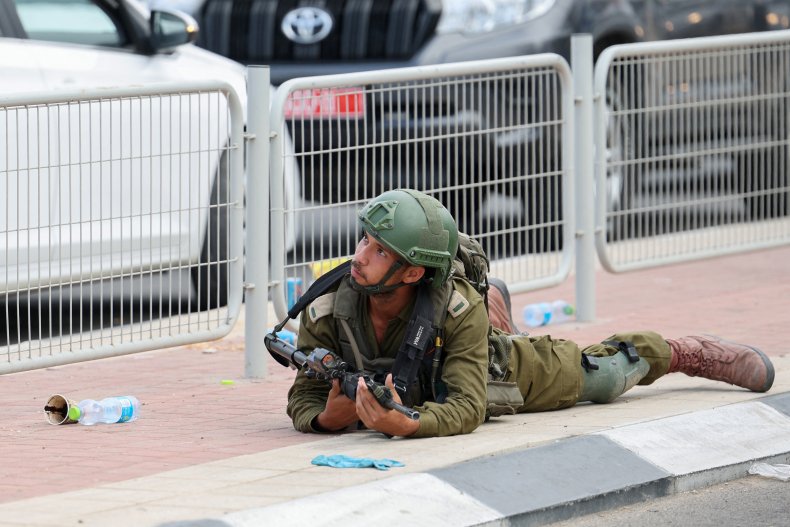
Israelis are now considering how the country was caught so catastrophically off guard as speculation mounts of foreign backing for the raid.
Hamas has long been funded, armed and trained by Iran, as one of the Islamist militant organizations—alongside Islamic Jihad also in Gaza, Lebanese Hezbollah, the Houthis in Yemen, and a litany of Shia paramilitary formations in Iraq—leveraged by Tehran in its strategic confrontation with Israel and its Western backers.
The weekend attack appears to have thwarted—or at least delayed—the planned normalization deal between Israel and Saudi Arabia; a key strategic goal for Tehran.
Initial reports—and a statement from Hamas—suggest that Iran had a hand in the landmark assault, which is thought to have been prepared over several weeks. Secretary of State Antony Blinken, though, said on Sunday he has "not yet seen evidence that Iran directed or was behind this particular attack, but there is certainly a long relationship." Iran's mission to the United Nations has denied any involvement.
There has also been speculation on social media of Russian involvement in the Hamas operation, though there is no evidence indicating Moscow's alleged role. Newsweek has contacted the Russian foreign ministry by email to request comment.
The Institute for the Study of War has suggested that Russia might benefit from the shift in international attention away from its atrocities in Ukraine and towards the deteriorating situation in Israel and the Palestinian territories. Israel is expected to launch a fresh and bloody ground assault into Gaza in the coming days, while tensions remain high in the occupied West Bank and along the border with Lebanon, where Hezbollah enjoys de facto control.
Regardless, there is no evidence of direct Russian involvement in the weekend attack. Hamas has controlled the Gaza Strip since 2007 and has a long history of infiltration operations into Israeli territory. The militants appear to have used their traditional mixture of indigenous and Iranian weapons for the assault.
Some pro-Ukrainian accounts on X, formerly known as Twitter, claimed without evidence that the Wagner Group mercenary organization may have trained the Hamas units that launched the attack. Wagner has no known presence in the Palestinian territories, while Hamas' assault units are highly experienced and trained with the assistance of outside powers like Iran.
Others incorrectly suggested that only Russia could have instructed Hamas in its use of drone bombers to target Israeli armor and observation posts. Hamas was at the forefront of the adoption of commercial and military drones, and has regularly used them to attack Israeli military, civilian and infrastructure targets in Israel and the Gaza Strip.
Oleg Ignatov, the Crisis Group think tank's senior Russia analyst, told Newsweek: "I haven't seen any evidence; I haven't seen it in public, I haven't heard anything about this from my conversations. It's difficult to imagine that Russia participated in the planning of this attack.
"Of course, we live in a world where we can't exclude anything. But I haven't seen any evidence."
Russia has long maintained a close working relationship with Iran and its network of partner militant organizations—especially Hezbollah in Lebanon—across the Middle East, seeing them as an alternative power base capable of challenging regional American and allied interests. Moscow has drawn closer to Iran since the Kremlin launched its full-scale invasion of Ukraine in February 2022.
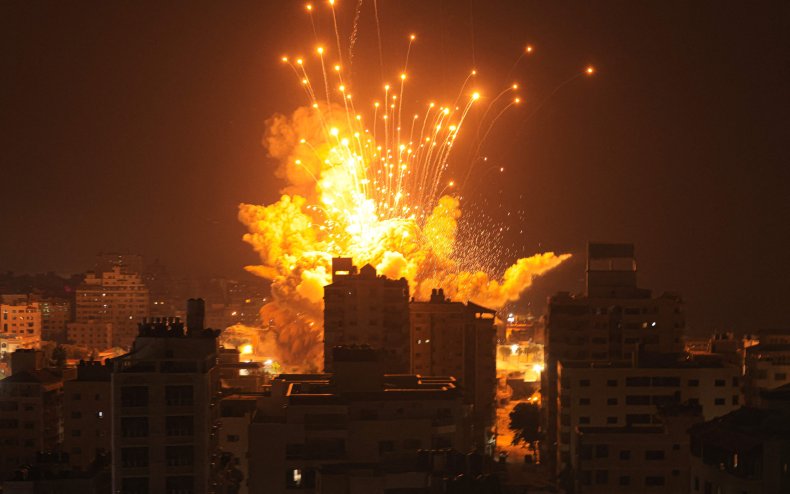
The Kremlin has retained high-level contacts with Hamas. In March, the militant group sent a high-level delegation to Moscow to hold talks with Russian Foreign Minister Sergei Lavrov, who subsequently warned that Hamas' "patience" with Israel was "running out." Hamas leaders also visited Russia in May and September 2022.
Such diplomatic channels should not be confused with direct support, Ignatov said. "Russia has very good connections with Hamas, and everybody knows about this," he said. "But I think that was part of the policy in the Middle East that it was advantageous for Russia to have the ability to communicate with everyone."
In seeking to bolster its international prestige and influence, Ignatov said Moscow is more interested in involvement in peace talks rather than trying to sway the fighting. "Russia would be interested in participating in any possible negotiations," he said. "This means, of course, it would would not be interested in supporting one of the sides."
Deputy Foreign Minister Mikhail Bogdanov was among those who called for calm over the weekend. "It goes without saying that we always call for restraint," the diplomat said, as quoted by the Interfax news agency. Former President Dmitry Medvedev—known for his anti-Ukrainian and anti-Western diatribes—took the opportunity to blame the U.S. for the broader Israeli-Palestinian conflict.
But some Russian propagandists reveled in Israel's defeat. Vladimir Solovyov said the Hamas attack was a "loud slap" for Israel and its intelligence services, blaming the U.S. for failing in its role as the "guarantor of peace in the region" and claiming without evidence that Ukraine provided weapons to Hamas.
Others used the attack to hit out at Russians who fled to Israel to escape Moscow's disastrous war on Ukraine. Margarita Simonyan, the head of RT, wrote on social media: "The country that is not at war with its neighbors is again at war with its neighbors. We await the exodus of Russian pacifists. Then again, we won't hold our breath."
Sergey Mardan wrote in a post on his Telegram channel: "This mess is beneficial for Russia, because the globalist toad will be distracted from Ukraine and will get busy trying to put out the eternal Middle Eastern fire."
"Iran is our real military ally," Marden added. "Israel is an ally of the United States. Therefore, choosing a side is easy!"
But goading from state media talking heads is not the same as foreign policy, Ignatov said. "That's not the policy, it's wishful thinking," he explained.
"They think that the world works like this. If there is a war in Israel, it means that the United States will send shells and ammunition to Israel rather than to Ukraine. And that means that Russia will have an advantage."
Update 10/9/23 at 7:35 a.m. ET: This article has been updated to include comment from Oleg Ignatov.




Comments
Post a Comment